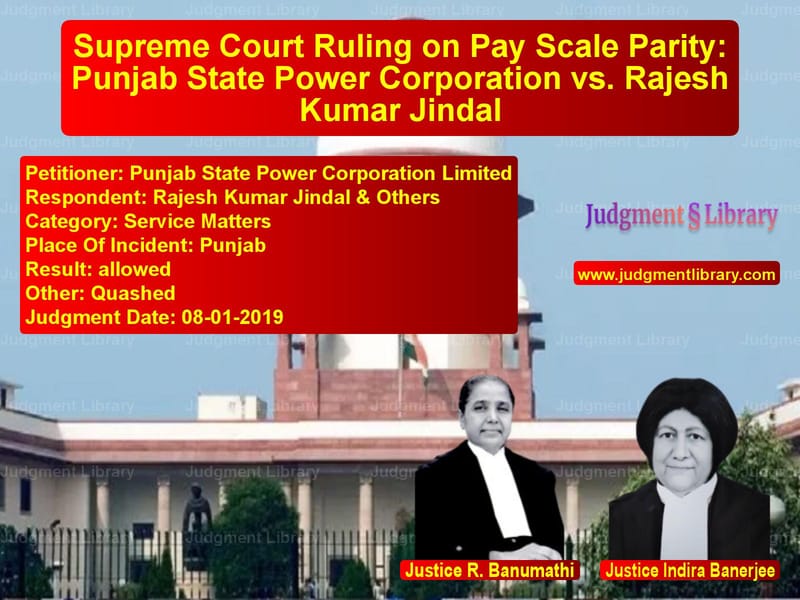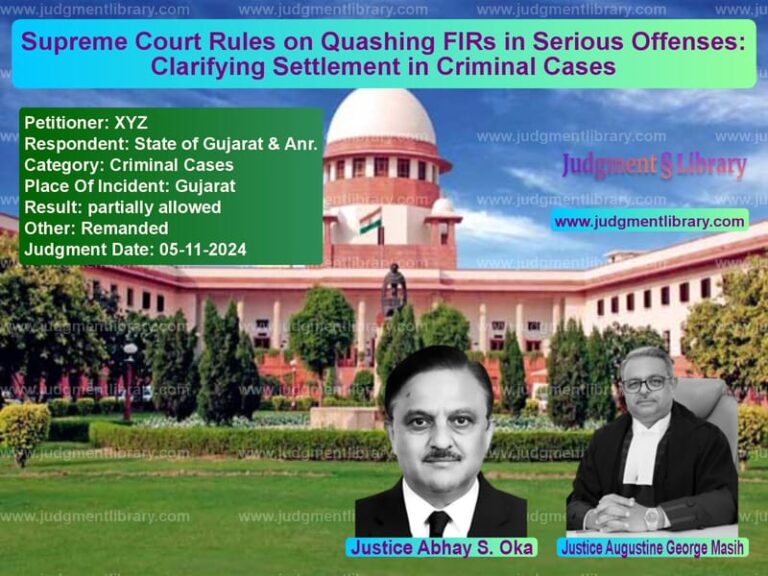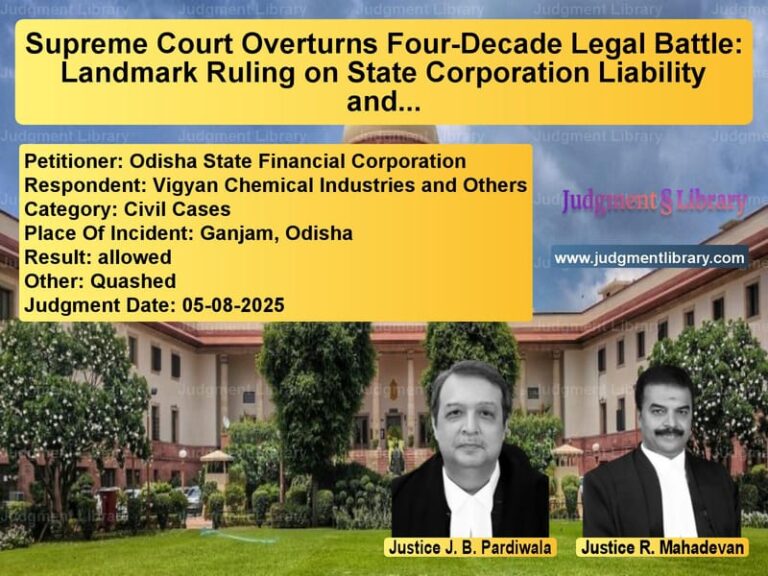Supreme Court Ruling on Pay Scale Parity: Punjab State Power Corporation vs. Rajesh Kumar Jindal
The Supreme Court of India recently delivered a crucial judgment in the case of Punjab State Power Corporation Limited vs. Rajesh Kumar Jindal & Others, addressing the issue of pay scale parity between Head Clerks and Internal Auditors in the Punjab State Electricity Board (PSEB). This case raised important questions about employment policies, parity in pay structures, and the jurisdiction of courts in deciding pay disputes.
The core issue revolved around whether Internal Auditors should receive the same pay scale as Head Clerks, given that both posts belonged to Group XII. The respondents contended that they were historically treated on par with Head Clerks, and the disparity created by a pay revision in 1990 was unfair. The Supreme Court analyzed the claims, emphasizing the principles governing pay scale revisions and equality in employment.
Background of the Case
The dispute originated when the Punjab State Electricity Board (now Punjab State Power Corporation Limited) revised the pay scales in 1990, providing Head Clerks with a higher scale (Rs. 2000-3500) while keeping Internal Auditors at a lower scale (Rs. 1800-3200). The respondents, who were Internal Auditors, challenged this disparity before the Punjab and Haryana High Court, citing Article 14 of the Constitution, which guarantees the right to equality.
The High Court ruled in favor of the Internal Auditors, holding that parity in pay scale had been maintained for two decades and that disturbing this parity was arbitrary. The Board appealed against this decision before the Supreme Court.
Petitioner’s Arguments
- The Board argued that pay scale determination falls within the domain of expert committees, such as the Pay Anomaly Committee, and should not be interfered with by the courts.
- The nature of work, method of recruitment, and responsibilities of Head Clerks and Internal Auditors were different, justifying the pay scale distinction.
- Internal Auditors had better promotional prospects than Head Clerks, making the comparison inappropriate.
- Merely being placed in the same group (Group XII) did not entitle Internal Auditors to the same pay scale.
Respondent’s Arguments
- The respondents claimed that for over 20 years, both posts enjoyed pay scale parity, and the sudden change was unjustified.
- Internal Auditors were promoted from the same feeder cadre as Head Clerks, making their treatment under different pay scales arbitrary.
- Disturbing established parity violated Articles 14 and 16 of the Constitution.
- The revision was applied retrospectively from 1986, adversely affecting Internal Auditors who had already been promoted.
Supreme Court’s Judgment
The Supreme Court, led by Justices R. Banumathi and Indira Banerjee, ruled in favor of the Board, overturning the High Court’s decision. The key findings were:
- Scope of Judicial Review: The Court emphasized that pay scale decisions should be left to expert committees like the Pay Commission, and courts should interfere only if there is clear discrimination.
- Difference in Nature of Work: The Court found that the duties, responsibilities, and recruitment methods for Head Clerks and Internal Auditors were distinct, justifying separate pay scales.
- Impact of Promotional Avenues: Internal Auditors had better career progression opportunities, making their pay scale comparison with Head Clerks inappropriate.
- Historical Parity Not Binding: The fact that the two posts had the same pay scale for two decades did not create a vested right for Internal Auditors.
- Financial Impact: Granting pay parity to Internal Auditors would have significant financial repercussions, affecting the public service-oriented Board.
Observations from the Judgment
The Court reiterated that courts should not interfere in administrative pay scale decisions unless they are patently arbitrary. It cited Kshetriya Kisan Gramin Bank vs. D.B. Sharma, stating:
“In the matter of equation of posts or equation of pay, the same should be left to the Executive Government, who can get it determined by expert bodies like the Pay Commission.”
Additionally, the Court noted:
“The burden of proving parity in pay scales rests on the claimants, and they must establish that they are performing the same duties under identical service conditions.”
Conclusion
The Supreme Court’s ruling reinforced the principle that pay scales must be determined by expert bodies and not through judicial intervention. It clarified that mere historical parity does not confer a right to equal pay if the nature of work and promotional avenues differ. The judgment serves as a crucial precedent in employment law, ensuring that pay scale decisions are based on sound administrative considerations rather than perceived past practices.
Petitioner Name: Punjab State Power Corporation Limited.Respondent Name: Rajesh Kumar Jindal & Others.Judgment By: Justice R. Banumathi, Justice Indira Banerjee.Place Of Incident: Punjab.Judgment Date: 08-01-2019.
Don’t miss out on the full details! Download the complete judgment in PDF format below and gain valuable insights instantly!
Download Judgment: Punjab State Power C vs Rajesh Kumar Jindal Supreme Court of India Judgment Dated 08-01-2019.pdf
Direct Downlaod Judgment: Direct downlaod this Judgment
See all petitions in Employment Disputes
See all petitions in Promotion Cases
See all petitions in Public Sector Employees
See all petitions in Judgment by R. Banumathi
See all petitions in Judgment by Indira Banerjee
See all petitions in allowed
See all petitions in Quashed
See all petitions in supreme court of India judgments January 2019
See all petitions in 2019 judgments
See all posts in Service Matters Category
See all allowed petitions in Service Matters Category
See all Dismissed petitions in Service Matters Category
See all partially allowed petitions in Service Matters Category







